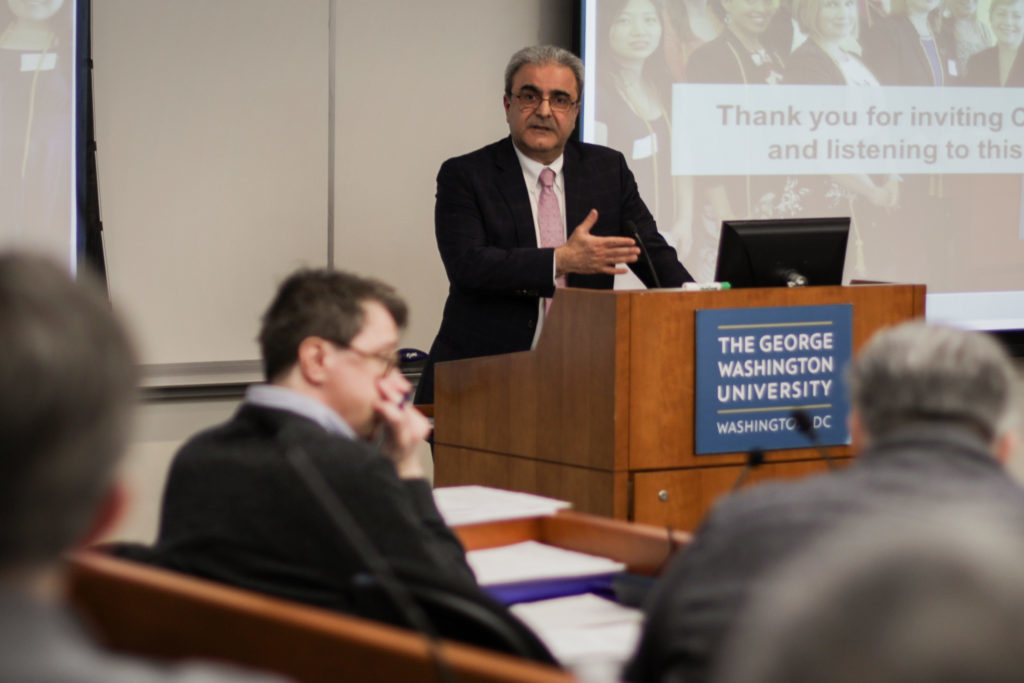The College of Professional Studies is earning more than half of its revenue from online courses – making the college a leader in online learning at GW.
Fifty-four percent of the college’s revenue comes from students enrolled in online programs or courses and 60 percent of its students took at least one online course this academic year, Ali Eskandarian, the dean of the college, said at the April Faculty Senate meeting. Faculty said the school has embraced online learning because many of their students are non-traditional, meaning they already have professional jobs or families that take up a significant amount of time.
The school began offering online courses a decade ago, and since then online learning has become a dominant part of the school’s mission, Eskandarian said in an email.
The college houses 31 graduate and undergraduate programs that are designed for working professional students. Eight of these programs can be completed entirely online without having to travel to any of GW’s campuses.
Eskandarian said he expects the number of online students in CPS to continue to grow in future years.
“We anticipate that the number of students taking advantage of some form of online learning will increase in the coming years, as working adults appreciate the flexibility it affords them in pursuing their education,” he said.
Jeff Delinski, the director of the school’s police and security studies program, said online courses appeal to students working full-time who don’t have the flexibility or time for on-campus courses.
“Our students are people who are in the workforce,” Delinski said. “They’re career professionals, so they have full-time jobs, and often have families and other responsibilities outside work and home.”
Delinski said the school’s programs also appeal to international students and both active duty military members and veterans.
“People outside of the Washington, D.C. area can still get the same quality of education from the same professors teaching the same courses that they would if they were to attend the courses at the Arlington center,” Delinski said. “It opens up our programs to an international audience.”
The police and security studies program operates under a “self-paced” structure, giving students access to the syllabi in advance and allowing students to work on assignments whenever they fit in their schedules, he said. Twenty-seven students are currently enrolled in the program.
“The assignment deadlines are firm, but the student has the opportunity to work on their assignments at their own pace,” Delinski said.
The revenue increase allows the college to continuously update technology, creating an interactive environment for instructors and students, he added.
“What we’re able to do is continue to make our programs cutting edge, meaning we have constant renewal and revitalization of our courses,” Delinski said. “We’re able to use new technology to record lectures and interactive types of processes with our students.”
Toni Marsh, the director of the paralegal studies program, said some students enroll in online courses because they prefer a different learning environment. Students who are introverted feel more comfortable engaging in an online class, she said.
“So even if you’re very shy and you don’t want to speak out in a room, you might be OK with typing your comments,” she said. “Your comments are heard just as well as the extroverted person in the front row, and that’s a nice environment for a lot of people.”
Marsh said online learning gives students more control over how they learn the course material because they can read lectures slowly or stop and pause live videos.
This changing trend towards taking more online courses is not unique to GW. Eric Friedman, the director of Boston University’s Distance Education staff, said the university has seen increased enrollment in online courses since they began offering them in 2012.
“The increase seems to be mostly based on convenience, flexibility and the manageability of taking courses part-time over a longer period of time and still earning a degree from a university like BU,” Friedman said.
Eric Black, an assistant professor and researcher of educational technology at the University of Florida, said faculty who are typically trained to teach in-person classes usually don’t fully adjust to online education.
This semester, GW’s Teaching and Learning Center began offering a course to help faculty learn how the best ways to teach online courses.
“In my opinion, regardless of institution, few faculty are well prepared by their institutions to teach online and few institutions have the resources available or afford the time to train faculty to do so effectively,” Black said.





